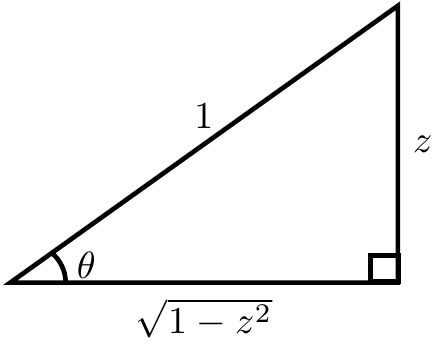Difference between revisions of "Derivative of arcsin"
From specialfunctionswiki
(→Proof) |
(→Proof) |
||
| Line 5: | Line 5: | ||
==Proof== | ==Proof== | ||
| − | If $\theta=\mathrm{arcsin}(z)$ then $\sin(\theta)=z$. Now use [[implicit differentiation]] to get | + | If $\theta=\mathrm{arcsin}(z)$ then $\sin(\theta)=z$. Now use [[implicit differentiation]] with respect to $z$ to get |
$$\cos(\theta)\theta'=1.$$ | $$\cos(\theta)\theta'=1.$$ | ||
The following image shows that $\cos(\mathrm{arcsin}(z))=\sqrt{1-z^2}$: | The following image shows that $\cos(\mathrm{arcsin}(z))=\sqrt{1-z^2}$: | ||
Revision as of 21:08, 15 September 2016
Theorem
The following formula holds: $$\dfrac{\mathrm{d}}{\mathrm{d}z} \mathrm{arcsin(z)} = \dfrac{1}{\sqrt{1-z^2}},$$ where $\arcsin$ denotes the inverse sine function.
Proof
If $\theta=\mathrm{arcsin}(z)$ then $\sin(\theta)=z$. Now use implicit differentiation with respect to $z$ to get $$\cos(\theta)\theta'=1.$$ The following image shows that $\cos(\mathrm{arcsin}(z))=\sqrt{1-z^2}$:
Hence substituting back in $\theta=\mathrm{arccos}(z)$ yields the formula $$\dfrac{\mathrm{d}}{\mathrm{d}z} \mathrm{arcsin(z)} = \dfrac{1}{\cos(\mathrm{arcsin(z)})} = \dfrac{1}{\sqrt{1-z^2}},$$ as was to be shown. █
